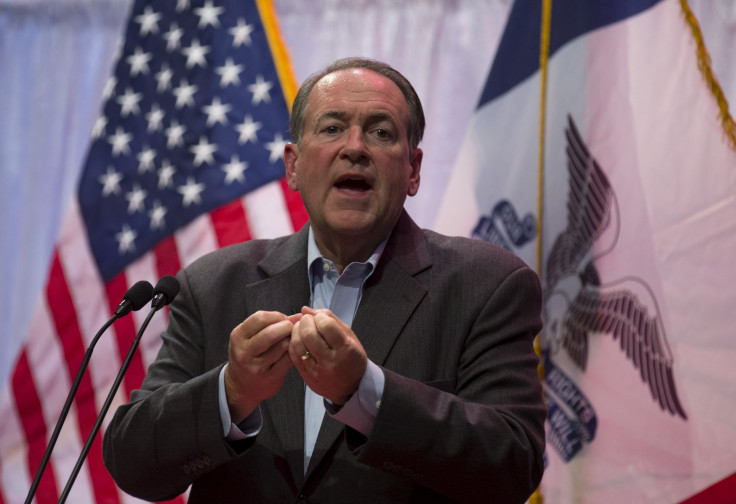Mike Huckabee 2016 Announcement: Can Former Arkansas Governor Capitalize On 2008 Momentum?

As former Arkansas Gov. Mike Huckabee embarks on what is anticipated to be his second run for the U.S. presidency, with his announcement expected Tuesday, the former Fox News Channel host will likely look to capitalize on the momentum that made him the last man standing against the eventual Republican Party nominee John McCain in 2008. That year, Huckabee was the sole social conservative in the race and gained steam thanks to evangelical voters.
But much has changed in the eight years since Huckabee’s first campaign. With more social conservatives in the race and the rise of super PACs favoring candidates with big-money backers, Huckabee will have more obstacles between him and the GOP nomination in 2016 than he did in 2008.
“If you really aren’t on the verge of winning -- kind of being the party’s heir apparent -- you end up running weaker the second time around,” said Andrew Dowdle, an associate professor of political science at the University of Arkansas who specializes in the presidential nomination process. “The odds are stacked against him there.”
When Huckabee won the crucial Iowa caucuses in 2008, buoyed by the support of evangelical voters, he didn’t have to compete hard against other candidates for that slice of the electorate. In 2016, however, Huckabee will face competitors during primary season such as U.S. Sen. Ted Cruz of Texas, with others possibly being retired neurosurgeon Dr. Ben Carson and former Sen. Rick Santorum of Pennsylvania, who won Iowa in 2012 and stayed in the race against the eventual nominee Mitt Romney with the support from wealthy benefactor Foster Friess.
“That niche is a niche that is pretty well occupied by candidates who are either new or more unique candidates like Ben Carson or Ted Cruz, who might be viewed as a better choice in that niche,” Dowdle said.
Also complicating Huckabee’s chances are that he doesn’t have a clear rationale for running other than “self-aggrandizement,” said Matt Dallek, an assistant professor at the graduate school of political management at George Washington University in Washington. It has been 10 years since Huckabee left office as Arkansas governor and about eight years since he first ran for president. “It’s unclear what kind of space in the primary or in the party that he hopes to fill,” Dallek said. “To me, it feels more like a vanity project than it does a serious effort to inject a set of ideas or particular vision into the race or to have a real shot at contending.”
According to Dallek: “Huckabee is in some ways like Sarah Palin or Donald Trump or Michele Bachmann. He kind of crosses now over between this world of conservative media figure who I’m sure is making a lot of money at Fox ... into presidential politics. But running for office, being at the stage at those debates, that’s helpful to his career, that’s helpful to him professionally and that’s helpful to his bottom line.”
Unlike the contest in 2008, the race in 2016 will be influenced by super PACs, which can raise unlimited amounts of money for their preferred candidates. This system favors those with vast and wealthy fundraising networks such as former Florida Gov. Jeb Bush, the early front-runner for the Republican nomination.
“If somebody wants to waste their money, they can certainly waste their money on Mike Huckabee, and that’s sadly the way our system works now,” Dallek said. “But having said that, a single billionaire or single multimillionaire who is willing to spend millions of dollars on a particular candidate can certainly, at a minimum, keep that candidate in the race.”
With nine months to go before the Iowa caucuses, Huckabee finds himself in sixth place among 14 possible 2016 GOP contenders, according to an aggregate of the most recent polls compiled by RealClearPolitics. With 8.3 percent support, Huckabee trails Bush, with 15 percent; Wisconsin Gov. Scott Walker and Sen. Marco Rubio of Florida, each with about 12 percent; and Sens. Cruz and Rand Paul of Kentucky, each with about 9 percent.
Dowdle said Huckabee’s poll numbers are at a “fairly healthy level at this point,” when name recognition drives most surveys. Huckabee hosted his eponymous show on Fox News for seven years before quitting in January to prepare for a likely presidential run. It remains to be seen whether his current poll numbers are a jumping-off point or the limit of his support.
“The issue becomes how much of that is just simply name recognition that’s unlikely to end up increasing or if that’s really his ceiling at this point,” Dowdle said.
Huckabee’s dream scenario would be to follow in Santorum’s 2012 footsteps, except with the ability to break out and win the support of other wings of the Republican Party. A teaser video on Huckabee’s website touts his record as governor of Arkansas, balancing the state budget every year for 10 years, cutting taxes and welfare, and raising the average Arkansas family’s income by 50 percent during his tenure.
Without a strong fundraising campaign, though, it’s unlikely Huckabee can attain crossover appeal. And even if he did, conservative groups such as the Club for Growth would attempt to knock Huckabee as a candidate who’s not viable, pushing for contenders such as Walker, Dowdle said.
“It becomes almost impossible for him to win,” he said. “Nothing is impossible in presidential politics, but it becomes such a large mountain to scale. I think you can end up saying he’s at a severe disadvantage.”
© Copyright IBTimes 2025. All rights reserved.






















